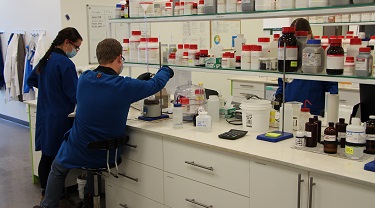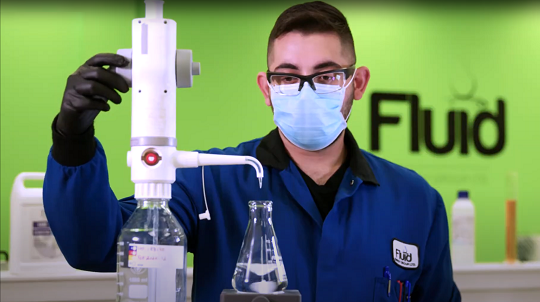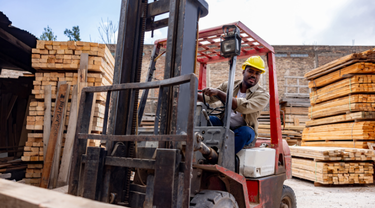
How a Calgary company used EDC to help it make a COVID-19 pivot
From idea to reality
Within two weeks of Purdy’s text to his CTO, Fluid was producing sanitizer that met World Health Organization (WHO) and Health Canada standards.
MyEDC account
Manage your finance and insurance services. Get access to export tools and expert insights.
Solutions
By product
By product
By product
By product
Insurance
Get short-term coverage for occasional exports
Maintain ongoing coverage for active exporters

Learn how credit insurance safeguards your business and opens doors to new markets.

See how portfolio credit insurance helped this Canadian innovator expand.
Guarantees
Increase borrowing power for exports
Free up cash tied to contracts
Protect profits from exchange risk
Unlock more working capital

Find out how access to working capital fueled their expansion.
Loans
Secure a loan for global expansion
Get financing for international customers
Access funding for capital-intensive projects

Find out how direct lending helped this snack brand go global.

Learn how a Canadian tech firm turns sustainability into global opportunity.
Investments
Get equity capital for strategic growth

Explore how GoBolt built a greener logistics network across borders.
By industry
Featured

See how Canadian cleantech firms are advancing global sustainability goals.

Build relationships with global buyers to help grow your international business.
Resources
Popular topics
Explore strategies to enter new markets
Understand trade tariffs and how to manage their impact
Learn ways to protect your business from uncertainty
Build stronger supply chains for reliable operation
Access tools and insights for agri-food exporters
Find market intelligence for mining and metals exporters
Get insights to drive sustainable innovation
Explore resources for infrastructure growth
Export stage
Discover practical tools for first-time exporters
Unlock strategies to manage risk and boost growth
Leverage insights and connections to scale worldwide

Learn how pricing strategies help you enter new markets, manage risk and attract customers.

Get expert insights and the latest economic trends to help guide your export strategy.
Trade intelligence
Track trade trends in Indo-Pacific
Uncover European market opportunities
Access insights on U.S. trade
Browse countries and markets
Get expert analysis on markets and trends
Discover stories shaping global trade
See what’s ahead for the world economy
Monitor shifting global market risks
Read exporters’ perspectives on global trade
Knowledge centre
Get answers to your export questions
Research foreign companies before doing business
Find trusted freight forwarders
Gain export skills with online courses
Get insights and practical advice from leading experts
Listen to global trade stories
Learn how exporters are thriving worldwide
Explore export challenges and EDC solutions
Discover resources for smarter exporting
About
Discover our story
See how we help exporters
Explore the companies we serve
Learn about our commitment to ESG
Understand our governance framework
See the results of our commitments
MyEDC account
Manage your finance and insurance services. Get access to export tools and expert insights.

The idea came to Calgary-based Fluid Energy Group’s CEO, Clay Purdy, simply enough. It was March 11th, fear of COVID-19 was growing, and he was out doing the same as everyone else – searching for hand sanitizer.
After going store to store and finding nothing, Purdy shot a few exploratory texts to his Chief Technical Officer, Dr. Markus Weissenberger, asking what was involved in manufacturing this liquid that had suddenly become so valuable and scarce.
He didn’t know it at the time, but that simple question would have a massive impact on the company he leads.
“The lab immediately started looking into sanitizer and quickly we recognized that we had major pieces in place to make this a viable addition to our product lines. We also had the contacts and distribution network to launch it in short order,” says Purdy.
Traditionally, Fluid mainly specialized in producing environmentally responsible, advanced chemical systems for a variety of uses within the oil and gas sector. They had business with customers in North America, the North Sea and the Middle East, among other markets. They also had Triton Cleaning Products, a sub-division specializing in cleaning solutions for RVs, marine and industrial uses like concrete truck wash.
Fluid already had a blending room where they could mix flammables, a license to buy specially denatured ethanol, an ethanol supplier relationship, and a relationship with packaging suppliers - all key requirements for producing hand sanitizer.

There were still significant hurdles to overcome, however, like meeting government regulations. But Fluid was quick to check those boxes, so quick in fact that when the government started offering emergency licenses to produce sanitizer, Fluid was the second company in Canada to receive one.
Within two weeks of Purdy’s text to his CTO, Fluid was producing sanitizer that met World Health Organization (WHO) and Health Canada standards.
They also had a buyer. Canadian Tire already stocked Triton Marine products, and now like many retailers, was looking for more sanitizer to sell. Fluid did a pilot run with an outlet in Calgary and when that went well, started selling sanitizer (under the Triton name) to stores across Canada.
Soon after that, an even more high-profile buyer emerged.
“Months before the pandemic hit, we’d created a small government relations team,” says Purdy. “That ended up being well-timed because when the call went out to Canadian businesses to procure mass amounts of sanitizer, we were able to engage with the right people at Health Canada and other government offices to promote our abilities,” says Purdy.
In mid-April, Fluid received a federal contract to supply 10-million litres of sanitizer for use in hospitals and other government purposes. This would require seriously ramped up production. And that’s where EDC was able to help.
“We’d been working with Fluid Energy for a number of years and knew they had the ability to take on a challenge like this,” says Shaun Naidu, EDC’s Account manager for Fluid Energy.
“From the beginning, EDC’s role in the pandemic response had been to bring liquidity to the market and support companies as they navigate this crisis. By making sanitizer, Fluid would not only help their own business, but also help in the effort to fight the spread of COVID-19. We were excited to support them.”
To produce millions of litres of sanitizer, Fluid had to put in large orders for key inputs, such as ethanol for the sanitizer and bottles for packaging.
EDC helped by guaranteeing letters of credit (LCs) issued by Fluid’s bank to its suppliers, through the Account Performance Security Guarantee program. LCs are key for negotiating favourable terms with suppliers, but to get a bank to issue them requires a company to commit cash or credit as collateral. The APSG minimizes that collateral requirement, freeing up capital.
Fluid also tapped EDC’s Export Guarantee Program. Through it, EDC can guarantee the majority of a loan or line of credit provided to a company by its banking partner. With EDC now sharing in the risk, it gives the bank extra comfort knowing that they’ll be repaid, and it can encourage them to lend more if needed.
“Getting the financing in place so quickly was key for us to be able to supply this mass quantity of product to the government in an expedited manner. Without it, we would have had to look at other financing options which would have delayed the opportunity to make a real and timely difference in the fight against COVID-19,” says Purdy. “With the continued support of EDC and a now very strong financial position, Fluid is well positioned to pursue and execute on large, longer term contracts going forward.”
Fluid has now supplied the full 10-million litres of sanitizer to the government, and its new product line now accounts for a major portion of revenue, overtaking its oil and gas sector business. The company is also starting to roll out new sanitizer options (like gelled versions) and making all the necessary investments to make sanitizer a permanent offering.
Fluid is also diversifying into surface disinfectants as well – the products used to disinfect chairs, tables, desks etc. It already offers three of these products with more launching soon, some of which are unique to Fluid and have patents being developed by their large R&D team in Calgary. According to Purdy, the global hand sanitizer market is around $5 billion and growing, whereas the disinfectant market is around ten times that size.
“Since March we’ve been building a solid foundation under this new pillar of our business, all with the goal of meeting global demand over the long term. We now have very robust US-based business with additional progress across Europe and the Middle East,” says Purdy.
Fluid is also adding several full-time, high paying positions - an estimated 40 by the end of the year. These have been created in the laboratory and quality assurance/quality control division alone to manage their 24/7 operations, as they move to become a Good Manufacturing Practices (GMP) Certified facility.
“Like everyone else, we hope this virus goes away as quickly as possible, but even after it does, we think that people will continue disinfecting and sanitizing at much higher levels than before COVID-19. People are much more careful now, and we want to make sure they have what they need to feel safe.”

Keep track of the international markets that matter to your business. Get the latest financial and macroeconomic information for both developed and emerging markets.

Discover Canadian tariffs on U.S. goods, CUSMA review and EDC support for managing trade risks.

Global growth stabilizes but faces ongoing policy shifts, tariffs and geopolitical uncertainty.

Tariffs and inflation weigh on growth in the U.S., Canada and Mexico in 2026.

With growing risks, Canadian companies face new challenges. EDC’s Global Economic Outlook offers insights to help you make better business decisions.